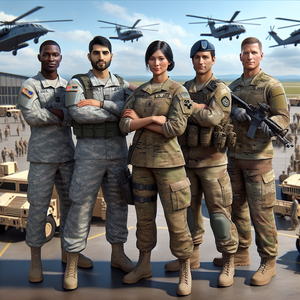
Exploring Rewarding Career Paths in the U.S. Army: Your Guide to Top Opportunities
The United States Army offers a diverse range of career paths that not only serve the nation but also provide individuals with invaluable skills and experiences for their personal and professional development. Each role in the Army comes with distinct responsibilities, making it possible to find a position that aligns with your interests and talents—whether in combat, technical fields, or support roles. This guide delves into ten compelling job opportunities within the Army, emphasizing how these positions can foster growth and lead to rewarding careers both in the military and in civilian life.
Job Summaries:
Intelligence Analyst (35F):
- As an Intelligence Analyst, you will be integral to the Army's operations by gathering and analyzing data.
- Your work involves interpreting intelligence reports, recognizing trends, and delivering insights that shape mission strategies.
- Typically, a bachelor's degree in a relevant field and strong analytical skills are necessary.
- Many who occupy this role experience high job satisfaction and find ample opportunities for advancement, making it one of the most appealing positions in the Army.
Cyber Operations Specialist (17C):
- Cyber Operations Specialists are essential for protecting Army networks from cyber threats.
- Responsibilities include monitoring systems, defending against attacks, and assessing vulnerabilities.
- A background in computer science or cybersecurity is often required, along with relevant certifications.
- Professionals in this field report significant career growth.
- This career is an excellent choice for those passionate about technology.
Combat Medic (68W):
- As a Combat Medic, you will be on the front lines, providing emergency medical care in diverse situations.
- This role demands extensive training in medical procedures and emergency response.
- Candidates must complete a medical training program and have exceptional interpersonal skills.
- Many Combat Medics transition successfully into civilian medical careers, leveraging the advanced medical training and experience gained during their service.
Human Resources Specialist (42A):
- Human Resources Specialists play a key role in managing personnel functions such as recruitment and employee relations.
- You'll oversee onboarding processes and ensure soldiers receive necessary support.
- A background in human resources or business management is preferred, along with strong communication and organizational skills.
- This position is critical for fostering Army morale and can lead to various opportunities in civilian HR roles.
Explosive Ordnance Disposal Specialist (89E):
- Explosive Ordnance Disposal (EOD) Specialists are tasked with identifying and neutralizing explosive threats.
- This high-stakes role requires rigorous training in explosives and robotics, alongside excellent problem-solving abilities.
- EOD specialists are vital for ensuring safety in potentially dangerous situations.
- Their specialized skills are highly sought after in civilian bomb disposal or security roles.
Aviation Operations Specialist (15P):
- Aviation Operations Specialists manage critical flight operations and logistics for Army aviation units.
- Coordinate with pilots and ground crews to ensure smooth operations.
- A background in aviation or logistics is advantageous.
- Strong organizational skills are important.
- Experience in this field can lead to lucrative careers in commercial aviation or aerospace management.
Military Police (31B):
- Military Police uphold law and order on Army bases and during deployments.
- Your duties will include conducting investigations and enforcing military laws.
- This role requires a high level of physical fitness and effective communication skills.
- Many Military Police members transition to civilian law enforcement roles, utilizing their training and experience.
Information Technology Specialist (25B):
- Manage Army computer systems and networks.
- Solid understanding of computer systems is essential.
- Troubleshooting skills are necessary.
- Knowledge of cybersecurity protocols is crucial.
- Role is important for maintaining Army technology operations.
- Skills gained can lead to successful careers in IT or cybersecurity in the civilian sector.
Financial Management Technician (36B):
- Financial Management Technicians oversee budgeting, accounting, and resource allocation within the Army.
- You'll ensure compliance with financial regulations and manage important records.
- A background in finance or accounting is beneficial, alongside solid analytical skills.
- This role is pivotal for strategic financial planning and can open doors to various opportunities in corporate finance.
Signal Support Systems Specialist (25S):
- Signal Support Systems Specialists are responsible for maintaining Army communication systems.
- A background in electronics or telecommunications is often required.
- Strong problem-solving skills are necessary for this role.
- This role is essential for ensuring reliable communication.
- The expertise gained can readily transfer to civilian roles in telecommunications or IT support.
These summaries provide a detailed look at the varied career opportunities available in the U.S. Army, each offering pathways to personal growth, skill enhancement, and dedicated service to the nation. By exploring these options, prospective recruits can find roles that align with their skills and aspirations, paving the way for fulfilling careers both in military service and civilian life. Current job openings can be found through the Army's recruitment channels, encouraging individuals to delve deeper into these opportunities to find the best fit for their unique talents and goals.
Explore More Jobs

